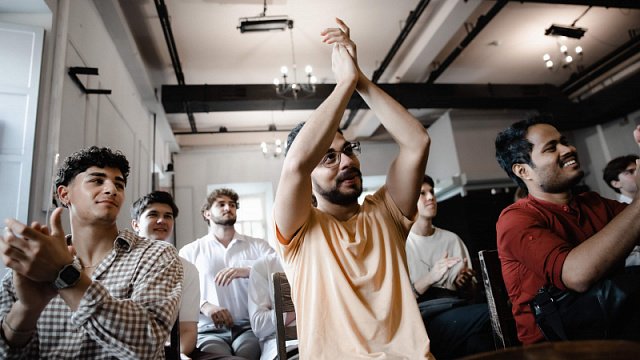30.08.24
10:30
Russia launches training programme for young artists from BRICS+ countries
More than 80 people applied for participation in the internship programme
The InteRussia fellowship programme in theatre arts was launched in Moscow at the Russian Institute of Theatre Arts – GITIS. It was developed in the Year of Russia’s BRICS Chairmanship in cooperation with the TV BRICS International Media Network and GITIS. Programme in the cycle of the InteRussia fellowship programme, which is realised by the Gorchakov Public Diplomacy Fund.
According to Grigory Zaslavsky, Rector of GITIS, despite the fact that the theatre university is actively engaged in international activities, this is the first project to be held within the BRICS framework. The programme has aroused interest among young artists.
“There was a serious selection process. The competition was almost 10 people per place. Out of more than 80 applications, we selected 12 participants”
Grigory Zaslavsky Rector of Russian Institute of Theatre Arts – GITIS
Deputy Executive Director of the Gorchakov Public Diplomacy Fund Victoria Karsliyeva, explains such high requirements for candidates by the concept of individual approach and mentoring for each participant.
Victoria Karsliyeva Deputy Executive Director of the Gorchakov Public Diplomacy Fund
For several weeks, young cultural figures from Argentina, Brazil, India, Iran, China and South Africa will get acquainted with the best practices of the Russian theatre school. They will receive classes and masterclasses from leading actors and teachers. The trainees will listen to lectures on the creative path of Stanislavsky and his pupils, as well as get acquainted with the system of stage reincarnation developed by the outstanding artist. In addition, there will be screenings of open classes and performances of the GITIS Training Theatre.
Janna Tolstikova, CEO of TV BRICS, said that the project was preceded by a large-scale information campaign.
“Dozens of articles on the fellowship were published by the media network’s partners in the BRICS countries. The coverage of publications totalled almost 50 million users. The number of applications submitted shows that the project is popular. Let’s hope that interest in it will continue to grow in the future”
Janna Tolstikova CEO of TV BRICS
It is worth noting that according to the organisers’ programme, strengthening the image of Russia and promoting Russian theatre tradition abroad is one of the objectives of the fellowship.
In an exclusive commentary for TV BRICS, Aleksander Barmak, director and lecturer at GITIS, said that introducing young people from the BRICS+ countries to Russian acting skills can be considered a unique experience due to the cultural differences and geographical distance between the members of the association. He believes that such interaction is also useful for Russia.
“The Russian theatre school gained a lot from the other countries’ theatre traditions. Chinese theatre has a special place here. Enrichment is a natural process of world culture”
Aleksander Barmak Director and lecturer at GITIS
The participants of the InteRussia fellowship programme also shared with TV BRICS their expectations.
Cape Town actress Rachel Saunders said that the internship in Moscow will allow her to improve her acting skills.
“The programme provides a unique opportunity to meet real professionals in their field. To learn more about the culture so that I can then learn from their experience,” she said.
Mayur Parmar from India wants to immerse herself more in the traditions of Russian theatre and cinema.
“We are acting how the methodology of Stanislavsky system works so we learn from Russian theatre, Russian films, Russian cinema, and Bollywood have great influence of Russian ideologies,” said the participant.
Wesley Moreira Guindani from the University of Sao Paulo is also interested in Stanislavsky’s system. According to him, few theatre teachers in Brazil have this methodology.
“The fellowship is a good opportunity for us to meet each other,” concluded the participant of the programme.
Photo: Melissa Filipchik
Back

